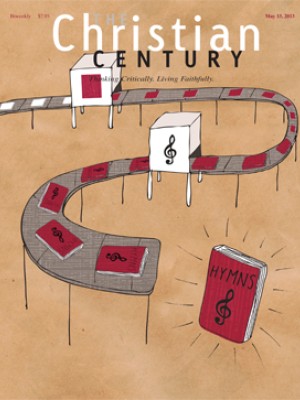Evangelicals see promise in immigration proposal
A coalition of evangelical leaders who hope to shape national immigration reform is expressing cautious optimism about a bipartisan Senate bill. The tentative evangelical endorsement of the Senate blueprint could be key because, more than any other religious group, white evangelicals harbor the most reservations about opening citizenship to immigrants in the U.S. illegally, according to a recent survey by the Public Religion Research Institute.
Richard Land, the outgoing public policy director for the Southern Baptist Convention, said the new bill passes the biggest hurdle for many evangelicals by not allowing amnesty and requiring undocumented immigrants to work toward American citizenship.
Read our latest issue or browse back issues.
“It provides an earned pathway to full legal status and then to citizenship for those who want it,” Land said April 17. “That is not amnesty in any dictionary in the English language.”
Members of the Evangelical Immigration Table coalition came together last June on the premise that evangelicals’ experience with immigrants in their own parishes calls them to action as lawmakers try to forge a new immigration reform law—an elusive goal that suddenly seems reachable.
Gabriel Salguero, a member of the group and president of the National Latino Evangelical Coalition, said the current push from evangelicals on immigration is unprecedented in the wide range of participating denominations.
“As evangelical leaders, we live every day with the reality that our immigration system is broken, and it’s not working,” Salguero said. “And it doesn’t reflect the values of human dignity and the respect for the rule of law that defines us as evangelicals and defines us as Americans.”
Coalition members stopped short of actually backing the new immigration bill—which requires more secure borders before new paths to citizenship open for those in the country illegally—but left the door open if its final version reflects their principles.
Among other values, the bill should respect the integrity of U.S. borders, keep families intact and protect “the God-given dignity of every person,” they said. Members of the coalition include World Vision, the National Association of Evangelicals, Sojourners and the National Hispanic Christian Leadership Conference.
Though immigration reform remains a tough sell in some corners of Capitol Hill, support from generally conservative evangelicals bodes well for the newly introduced bill, which has also drawn praise from President Barack Obama.
“This bill is clearly a compromise, and no one will get everything they wanted, including me,” Obama said. “But it is largely consistent with the principles that I have repeatedly laid out for comprehensive reform.”
According to the Pew Research Center for the People and the Press, 71 percent of Americans believe immigrants who live in the U.S. illegally should be allowed to stay. They are divided, however, on whether immigrants should be eligible for citizenship.
According to the PRRI study, majorities of all major faith groups support legalization “provided they meet certain requirements,” including more than seven in ten Hispanic Catholics and Protestants, two-thirds of Jews, more than 60 percent of Mormons, white Catholics and white mainline Protestants, and 56 percent of white evangelicals.
For Southern Baptist Pastor David Uth, immigration reform became a priority after a family in his Orlando megachurch faced deportation. For Bishop Ricardo McClin, it was time to speak up when members of a Church of God congregation that he oversaw stopped worshiping in Jacksonville because they feared detention.
Samuel Rodriguez, president of the National Hispanic Christian Leadership Conference and a longtime advocate for immigration reform, said personal experiences are what have driven many non-Hispanic clergy “off the fence.” “It’s not a political issue. It became a road to Damascus moment.”
The Evangelical Immigration Table has mounted a six-figure campaign that includes Christian radio ads and the distribution of more than 100,000 bookmarks urging congregants and members of Congress to read Bible passages about “welcoming the stranger.”
Jim Wallis, the evangelical founder of the antipoverty group Sojourners and author of On God’s Side: What Religion Forgets and Politics Hasn’t Learned about Serving the Common Good, said some Christians have seen a passage from the Gospel of Matthew in a new light. It includes the verse that reads: “I was a stranger and you welcomed me.” He believes a “biblical conversion” is occurring, along with a relational one.
“When you worship with people, you get to know them and you get to know their lives and their families and their kids and so stereotypes go away,” said Wallis. “And you understand who they are and that changes you.” —RNS






